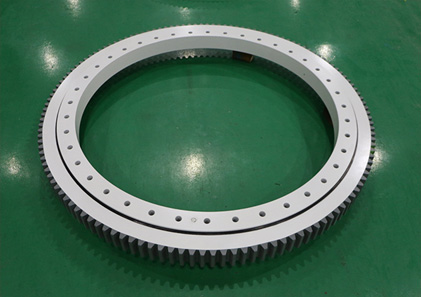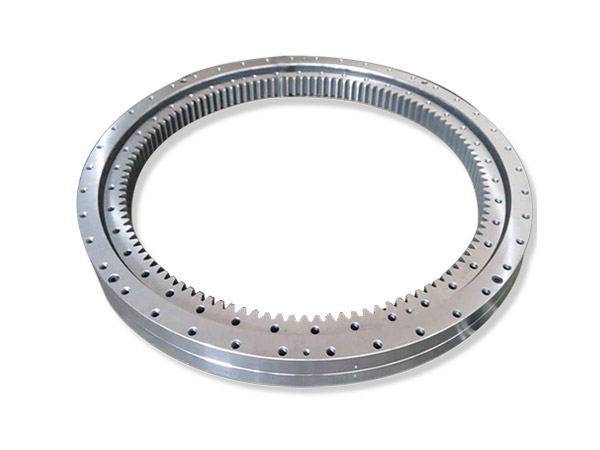What material is good for the slewing bearing and how should it be selected?
The material of the slewing bearing directly determines the performance and service life of the bearing. At present, the main structure of bearings on the market is mostly made of bearing steel, which has the characteristics of corrosion resistance and stability. Of course, in addition to bearing steel, there are also metal materials such as aluminum alloy or copper. In addition, the sealing ring and cage of the bearing may be different from the material of the main body of the bearing. The following slewing bearing manufacturers will share what material is good for the slewing bearing.
What material is good for the slewing bearing?

1. Material of ferrule and rolling element
The early slewing bearing used 45# steel, but it was gradually eliminated due to poor modulation performance in the later period. In the current more common processing technology, the slewing bearing rolling element adopts integrally hardened carbon chromium bearing steel. The grade is made of GCr15 or GCr15SiMn steel; the ring of the slewing bearing is made of surface hardened steel, and if there is no special requirement, it is made of 50Mn steel. But sometimes customers also choose to customize other grades such as 42CrMo, 40Cr, etc. The following describes the characteristics of these grades of steel.
(1) As a high-carbon steel, 42CrMo has good quenching and quenching properties and is an ideal material for slewing bearings.
(2) 50Mn has good hardenability and is also a high-quality choice for slewing bearings.
(3) 40Cr is also good in terms of mechanical properties, and it is still in the exploration and practice stage.
(4) GCr15 small slewing bearing can be selected, but it is generally not recommended to use it because of the troubles caused by full quenching in the process of milling and drilling.
2. Material of cage
Cages for slewing bearings have structural forms such as integral, segmented, and isolated block types. The types of cage materials are: low carbon steel stainless steel cage, bakelite/plastic (nylon) cage, brass/bronze/aluminum alloy cage, etc. The spacer type is made of polyamide 1010 resin, ZL102 cast aluminum alloy, etc. .
The characteristics of various material bearing cages are as follows:
(1) Steel bearing cage: It is often cold stamped from 08 and 10 carbon steel sheets. Commonly used steel cage materials include 20, 30, 45, 0Cr18Ni9, 1Cr18Ni9Ti, 40CrNiMo, ML15, ML20, etc., which are commonly used materials in bearing cages, which are solid, durable and stable.
(2) Non-ferrous metal bearing cage: Different from steel, non-ferrous metal has its special properties. For example, aluminum alloy has the characteristics of low density, good thermal conductivity, and good corrosion resistance; copper alloy has good thermal conductivity, low friction coefficient, Features such as good formability and high use temperature; zinc-aluminum alloy has the advantages of low cost, low density, and excellent performance.
(3) Non-metallic cage: non-metallic cage materials mainly include polymers and their composite materials, including nylon, phenolic tape, polytetrafluoroethylene, etc. The polymer material has good strength and elasticity matching, which can effectively reduce the heating and wear of the bearing.
3. Material of sealing ring
Bearing sealing materials are generally commonly used sealing materials, mainly: nitrile rubber, silicone rubber, fluorine rubber, EPDM, fluorobutadiene rubber, polytetrafluoroethylene, polyurethane rubber, acrylic rubber, Anaerobic glue, etc.
The sealing ring of the slewing bearing is made of oil-resistant rubber or NBR nitrile rubber. Compared with nitrile rubber, hydrogenated nitrile rubber has better oil resistance, but if you are not too demanding on oil resistance, use nitrile rubber, because hydrogenated nitrile rubber is relatively expensive. Nitrile rubber also has a certain degree of acid and alkali resistance. However, silica gel should be selected if the requirements for oil resistance and acid and alkali are higher, but its price is higher.
How to choose the material of the slewing bearing

The slewing bearing manufacturer said that the materials used in slewing bearings should be analyzed based on the current level of slewing bearing production technology. It is recommended that the materials of bearing rings, rolling elements, cages, and sealing rings should first consider the following materials.
1. Material of rolling element: GCr15SiMn is generally used for rolling element.
2. Ring material: 50Mn is used for the slewing bearing ring, but sometimes 42CrMo is used to meet the needs of the host in special applications.
3. Cage material: The cage has different structure types such as integral type, segmented type and isolated block type. The integral or segmented retainer adopts 20# steel or ZL102 cast aluminum alloy. The isolating block holder adopts polyamide 1010 resin, ZL102 cast aluminum alloy or QA110-3-1.
4. Sealing ring material: The slewing bearing should be made of oil-resistant rubber, fluorine-containing rubber, and oil-resistant nitrile rubber. The clearance of the slewing bearing The clearance of the slewing bearing is mainly used to compensate the manufacturing error and installation error of the slewing bearing supporting parts and the relevant host assembly parts to ensure the normal use of the bearing. According to the structure type/tolerance class of the slewing bearing and the pitch circle diameter of the rolling element group, the clearance value or the interference amount of the slewing bearing.
The above is the introduction of the slewing bearing manufacturer on the material of the slewing bearing. The bearing materials mentioned are all suitable for slewing bearings, but the specific use environment and performance requirements may have different requirements for the bearing materials. Please follow the actual situation. Choose the situation.


